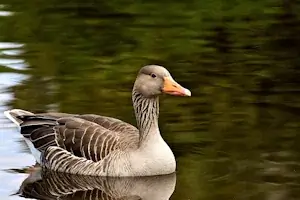Introduction: Why Keep Geese?
Geese are fascinating and versatile animals. Not only do they provide high-quality eggs and meat, but they also act as effective “lawnmowers” and reliable watchdogs. Their natural curiosity and social character make them popular animals for hobby farmers. This article provides you with a comprehensive overview of keeping geese in an animal-friendly manner – from stable design to feeding and care.
1. Basics of Goose Keeping
Are Geese the Right Animals for Me?
Geese are herd animals with pronounced social behavior. They are particularly suitable for people with enough space and an interest in nature.
- Space Requirements: Geese need plenty of room to roam and ideally access to a water source.
- Purpose of Keeping: Geese can be kept either as farm animals or ornamental pets.
Legal Requirements
Before acquiring geese, make sure to check the local regulations for goose keeping. In some countries, certain conditions or registrations may be required.
2. The Perfect Stable for Geese
Size and Design
A proper goose stable protects the animals from the weather and predators.
- Size: At least 1 m² of stable space per goose.
- Bedding: Straw or wood shavings that should be changed regularly.
- Ventilation: Good airflow without drafts.
Grazing and Pasture Area
Geese require plenty of movement and green fodder.
- Pasture Area: At least 20 m² per goose.
- Security: A fence is necessary to protect the geese from predators and prevent them from escaping.
Access to Water
Geese love water and use it to care for their feathers.
- Drinking: Fresh water should always be available.
- Pond: A small pond or tub is often sufficient if no natural water source is available.
3. Feeding Geese
Basics of Goose Feeding
Geese are herbivores and mainly eat:
- Green Fodder: Fresh grass, clover, and herbs.
- Supplemental Feed: Grain mixes with oats, barley, and corn, especially in winter.
- Treats: Fruit and vegetable scraps, but avoid moldy or poisonous plants.
Feeding Needs Throughout the Year
Feeding needs vary depending on the season:
- Summer: Primarily grazing.
- Winter: Supplement with hay and grain feed.
Water Requirements
Geese need fresh water every day, both for drinking and feather care.
4. Care and Health of Geese
Hygiene in the Stable
A clean stable is crucial for the health of geese.
- Stable Cleaning: Remove droppings and change bedding weekly.
- Drinking and Feeding Areas: Clean daily to prevent bacterial growth.
Identifying Illnesses
Healthy geese are active and have shiny feathers. Symptoms such as lethargy, diarrhea, or loss of appetite may indicate illness. Common problems include:
- Parasites: Mites or worms.
- Feather Problems: Poor feather care due to insufficient access to water.
Prevention and Treatment
- Regular Checks: Inspect geese weekly for visible issues.
- Vaccinations: Depending on the region, vaccines against poultry diseases may be necessary.
5. Behavior and Social Structure
Social Life of Geese
Geese are social animals and feel most comfortable in groups.
- Group Size: At least three geese, ideally a harmonious mix of geese and gander.
- Social Behavior: Geese form strong bonds with their companions and their keepers.
Activity Options
- Grazing: Ensure access to a varied pasture.
- Swimming: A pond or water tub provides entertainment and natural feather care.
- Interaction: Geese enjoy being observed and spoken to gently.
6. Advantages of Keeping Geese
Natural Lawn Mowers
Geese are excellent grass eaters and help keep your garden or pasture in shape.
Protection Against Intruders
Geese have strong territorial behavior and will alert you when strangers or predators approach.
Sustainable Meat and Egg Production
Geese lay about 30 to 50 eggs per year from spring to autumn. Their meat is considered a delicacy, especially during holidays.
7. Frequently Asked Questions About Goose Keeping
Are Geese Loud?
Geese can be noisy, especially if they feel disturbed. Their calls serve as communication and warnings.
Can Geese Stay Outdoors All Year?
Yes, geese are hardy and tolerate cold well, as long as they have a dry, windproof stable.
How Many Geese Should I Keep?
At least three geese, as they are social animals and feel more comfortable in a group.
Which Goose Breeds Are Suitable for Beginners?
- Dielem: Calm and easy to care for.
- Pommerngans: Versatile and robust.
- Toulouser Goose: Good for both meat and eggs.
8. Tips for Beginners
- Start with a small number: Three to five geese are sufficient to start.
- Ensure enough space: Geese need room to roam and access to water.
- Prepare for the seasons: In winter, geese need additional feed and a well-insulated stable.
- Stay informed: Regularly consult other keepers and literature to better understand your animals.
Conclusion: Keeping Geese – A Rewarding Experience
Raising geese is a fulfilling and practical task. With the right care and a suitable environment, geese will quickly feel at home and reward you with eggs, meat, and their unique personalities. Whether as a hobby, for self-sufficiency, or for landscape care – geese are versatile and grateful animals.

